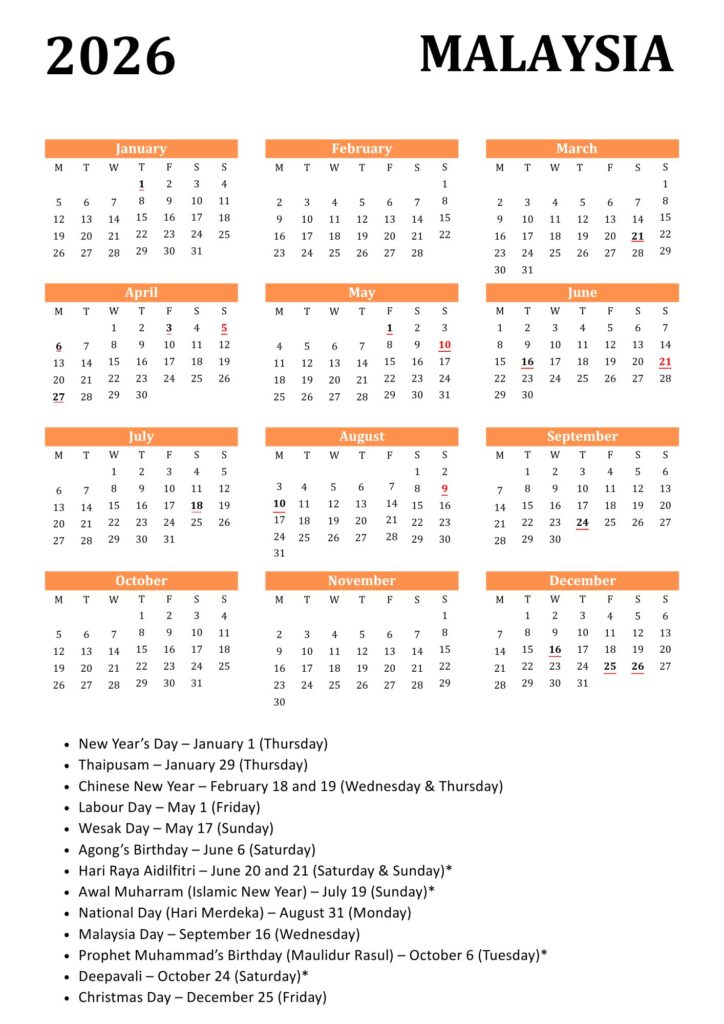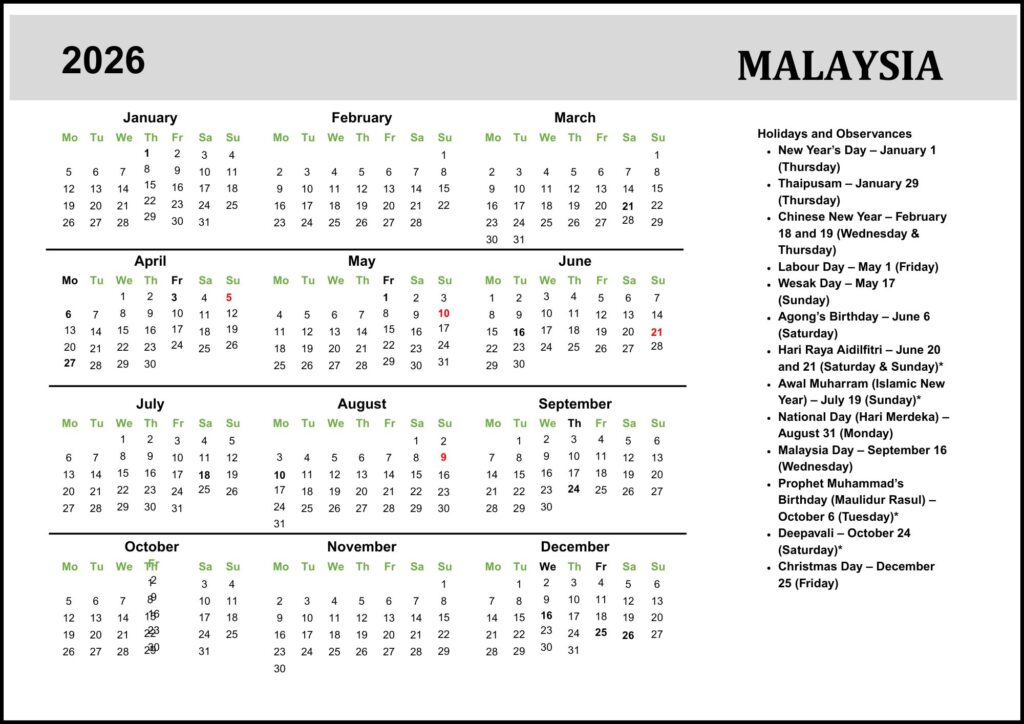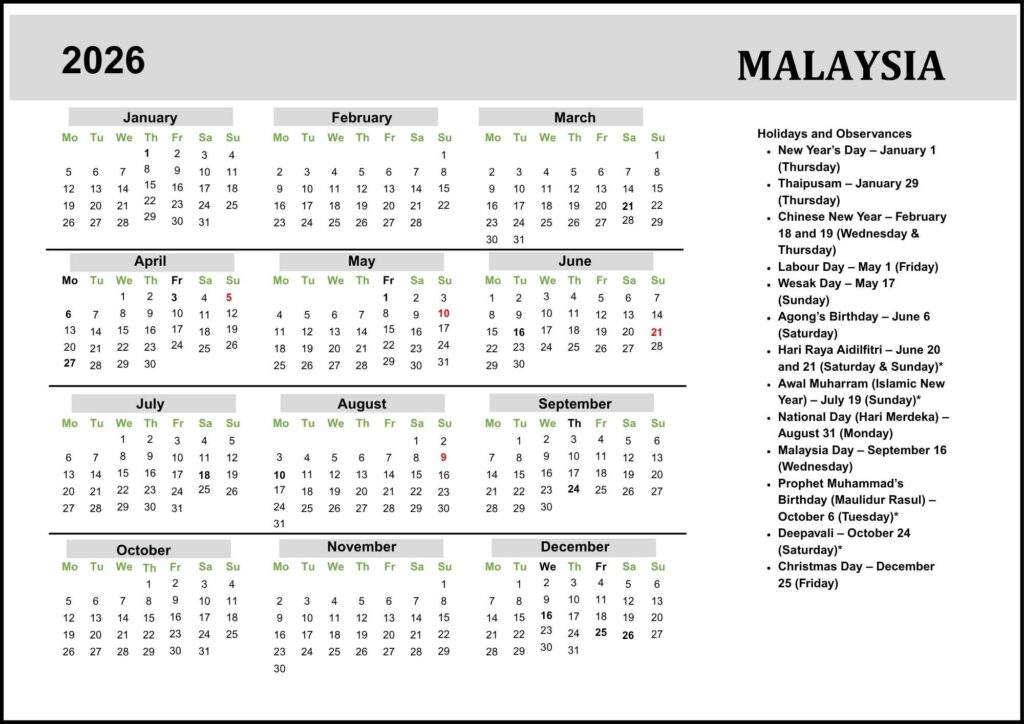Malaysia Calendar with Holidays 2026 [Free Printable]
Malaysia Calendar is a comprehensive summary of all public holidays, school holidays, and special events in Malaysia. Revealing Malaysia’s vibrant melting pot of cultures, the calendar also highlights key events including Hari Raya Aidilfitri, Chinese New Year, Deepavali, Gawai, Christmas, and many more.

It would also feature significant national holidays such as Hari Merdeka and Malaysia Day, which trigger Malaysian pride and patriotism. It is a crucial tool for the public, businesses, and tourists, enabling them to schedule events, travel, and work around these dates. It also emphasises school holidays and special events that reflect Malaysia’s rich cultural background, becoming a great way to keep you integrated, organised, and rallying from month to month.
Also Read: January February 2026 Calendar
Free Printable Malaysia Calendar 2026
The Free Printable Malaysia Calendar can be used for personal and school planning, appointments, classroom posts, meeting plans, timing, tasks, activities, holiday schedules, and many other purposes. It provides Malaysians with the convenience of planning their daily schedule, marking birthdays and festival details, and reminding them of public holidays and school terms in Malaysia. For professionals, it also helps in planning meetings, appointments, and deadlines, prioritising work-life balance, as highlighted by long weekends and holidays.

The academic tasks, examination dates, and project deadlines can be scheduled on the calendar, where both students and teachers can the advantage of it. Families can use iorganiseanize holidays, family reunions, and festivities such as Hari Raya, Chinese New Year, and Deepavali. Plus, the printable nature allows them to be featured on walls, placed on desks, or added to planners, so users can use them when needed at a moment’s notice and not have to look at their digital devices. This clean-cut calendar can also be used for goal setting, budgeting, and keeping to your exercise regime all year round.
Also Read: February March 2026 Calendar
Malaysia Holidays 2026
| Date | Day | Holiday Name |
|---|---|---|
| Thu, Jan 1 | Thursday | New Year’s Day |
| 17–18 Feb 2026 | Tuesday–Wednesday | Chinese New Year |
| 21–22 Mar 2026 | Saturday–Sunday | Hari Raya Aidilfitri (Eid al‑Fitr) |
| Fri, May 1 | Friday | Labour Day |
| Wed, May 27 | Wednesday | Hari Raya Haji (Eid al‑Adha) |
| Mon, Jun 1 | Monday | Yang di‑Pertuan Agong’s Official Birthday |
| Wed, Jun 17 | Wednesday | Awal Muharram (Islamic New Year) |
| Tue, Aug 25 | Tuesday | Maulidur Rasul (Prophet Muhammad’s Birthday) |
| Mon, Aug 31 | Monday | Merdeka Day (National Independence Day) |
| 16 Sep 2026 | Wednesday | Malaysia Day |
| 26 Aug 2026‡ | Wednesday | Prophet Muhammad’s Birthday (nationally observed) |
| 8 November 2026 | Sunday | Deepavali (National, except Sarawak) |
| 9 Nov 2026 | Monday | Deepavali Holiday (in lieu) |
| 25 Dec 2026 | Friday | Christmas Day |

New Year’s Day: New Year’s Day on January 1 is a public holiday in Malaysia, as the Gregorian calendar is widely used here. It is commonly marked by parties, fireworks, and countdowns the night before. Though not originally established by local tradition, the day serves as a significant cognitive break for people to reflect on the past year and establish personal or professional goals for the year to come. Businesses, schools, and government offices are usually closed, so people can take the time to relax or spend time with family.
Also Read: March April 2026 Calendar
Chinese New Year: Chinese New Year is one of the most significant festivals for the Malaysian Chinese. Spread out over two days, it normally occurs in late January to mid-February according to the lunar calendar. Join in the festivities & be reunited with family this lunar new year through ang pow, lion dance, firecrackers & delicious noms! Red iscolourcolor of decoration in homesymbolisebolize good fortune, as the holiday is also a timehonouringoring ancestors, and seeking prosperity for the new year.
Hari Raya Aidilfitri (Eid al‑Fitr): Hari Raya Aidilfitri, also known as Eid al-Fitr, is a significant Islamic celebration for Muslims to end Ramadan, the month of fasting. In Malaysia, this holiday is observed happily with prayers, family reunions, and an open house where traditional Malay cuisine such as ketupat and rendang is served. It’s a time of forgiveness, thankfulness, and giving back, during which Muslims and families dress in their native attire and visit loved ones, friends, and family. The festival can be up to two days in length, sometimes more if the festival coincides with an extended schedule of public holidays.
Also Read: April May 2026 Calendar
Labour Day: Labour Day (Hari Pekerja) is a nationwide celebration for workers that falls on 1 May. The day can include parades, speeches, and discussions on labour rights, but for many, it’s an excuse for a day off to rest. It also emphasises decent work practices and is a reminder that the labour movement is still having battles and making achievements, especially with Malaysia’s range of work types becoming larger and larger.
Hari Raya Haji (Eid al‑Adha): Hari Raya Haji (Eid al-Adha) is an Islamic festival that honours the willingness of Prophet Ibrahim to sacrifice his son to show obedience to Allah. In Malaysia, it is celebrated with communal prayers, the slaughtering of cattle (such as cows and goats), and the distribution of meat to the poor. It is an unspoken testament to faith, sacrifice, and charity. It is also the day of the Hajj (the pilgrimage to Mecca).
Also Read: May June 2026 Calendar
Yang di‑Pertuan Agong’s Official Birthday: The Yang di-Pertuan Agong’s Official Birthday is the first Monday of June and celebrates the current monarch of Malaysia. While the King’s real birthday is up for debate, the date is marked with official festivities, such as military displays, award-giving, and royal feasts. It is a public holiday and serves as Malaysia’s distinctive constitutional monarchy, celebrating national pride and unity amongst the people.
Awal Muharram (Islamic New Year): The new year in the Islamic lunar calendar begins on Awal Muharram and marks the migration (Hijrah) of Prophet Muhammad from Mecca to Medina. It is a day of reflection and spiritual rejuvenation — a day in which we confront our mistakes and vow to do better in the year ahead. Malaysian Muslims are free to attend religious lectures, prayer gatherings, and community events. It also teaches us about patience, sacrifice, and endurance in the face of trials.
Also Read: Islamic Calendar 2026
Maulidur Rasul (Prophet Muhammad’s Birthday): Maulidur Rasul marks the birth of the Prophet and is celebrated with religious sermons, communal prayers, procession, and feasts that focus on the teachings of the Prophet. In Malaysia, it is observed as a public holiday where mosques and public spaces hold special programs that advocate peace, compassion, and unity. It is a time when Muslims should contemplate the contribution of the Prophet and emulate his approach in day-to-day life.
Merdeka Day (National Independence Day): On August 31st, we celebrated Merdeka Day, as Independence Day, for Malaysia, when the country gained independence from British colonial rule in 1957. It is a nationalistic holiday with parades, flypasts, cultural events, and fireworks. People would dress in national attire and attend parades. The day symbolises the country’s unitary existence and the struggle of its founding fathers for freedom.
Malaysia Day: Malaysia Day is on September 16th and marks the day in 1963 when the nation of Malaysia was formed after Sabah and Sarawak, along with Singapore (which has since left), joined together with Malaya to form a new federation. It is a day to celebrate national integration and unity in diversity. There are cultural displays and educational shows for the public in addition to political stalls and merchandise for party supporters, particularly in East Malaysia, where the holiday is a significant celebration among the Borneo people.
Prophet Muhammad’s Birthday (nationally observed): This day, also known as Maulidur Rasul, a national holiday for Muslims in Malaysia, was already mentioned above. That includes religious sermons, readings of life stories of the prophet, and reflections on the spiritual life. It enhances the Muslim community’s understanding of Islamic doctrines as well as promotes the Prophet’s good manners, such as kindness, humility, and faith.
Deepavali (National, except Sarawak): Deepavali, or Diwali, is the Hindu Festival of Lights and is an important public holiday in Malaysia, particularly in Indian-dominated states. It represents the victory of light over darkness and of good over evil. Houses are adorned with oil lamps (diyas), kolam (colourful design made of coloured rice), and decorative festive lights. Families offer prayers, wear new clothes, and make sweet dishes. A time of celebration and family togetherness, and sharing the joys of each other.
Also Read: Hindu Calendar 2026
Deepavali Holiday (in lieu): Where Deepavali falls on a Sunday, the next day is declared a holiday in lieu in most states of Malaysia. This “in lieu” public holiday is so that people can take a full holiday from work to celebrate and have fun. It preserves the country’s commitment to multiculturalism and permits celebrated extended family holidays and travel.
Christmas Day: Christmas Day (25 December) is a public holiday in Malaysia and is observed by several Christian groups, but is most notably recognised with religious services, feasting, and gift-giving. It is technically an Islamic religious festival, but the celebration is also observed by many Malaysians who are not Muslim, with decorations, carolling, and public events. Christmas trees and lights often adorn shopping malls and homes. It stands for joy and generosity, and the spirit of togetherness.
You May Also Like:
- Excel Calendar 2026
- Blank Calendar 2026
- Yearly Calendar 2026
- January A4 Calendar 2026
- February A4 Calendar 2026
- March A4 Calendar 2026
FAQs
1. How many public holidays are there in Malaysia in 2026?
Malaysia typically has around 18 national public holidays in addition to state-specific holidays in 2026.
2. Does each Malaysian state have different holidays in 2026?
Yes. States like Johor, Kelantan, Sabah, Sarawak, and others observe additional local holidays.
3. Will Malaysia’s 2026 school holidays follow the official calendar?
Yes, school holidays are released by the Ministry of Education and may differ between Zone A and Zone B.
4. Are all 2026 national holidays long weekends?
Not all, but several public holidays in 2026 may fall near weekends, creating long weekends.
5. Where can I download the 2026 Malaysia holiday calendar?
You can download it from the official government portals, state websites, or reliable online calendar resources.
